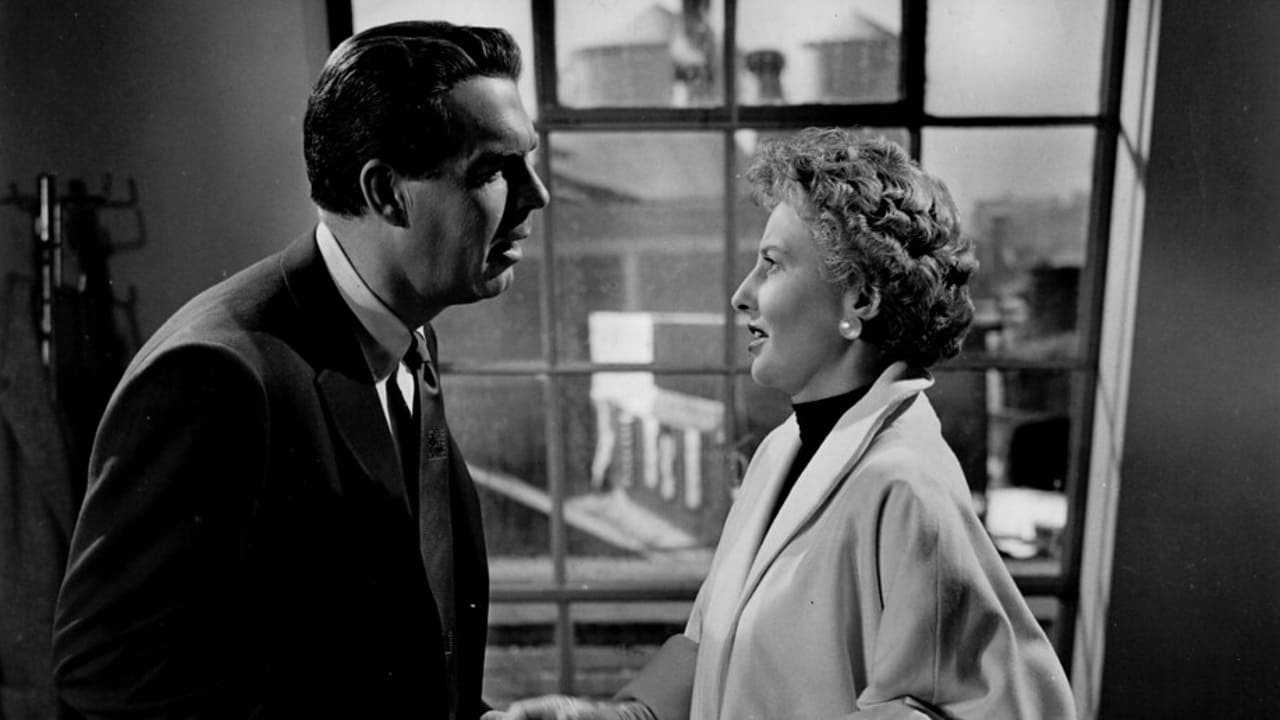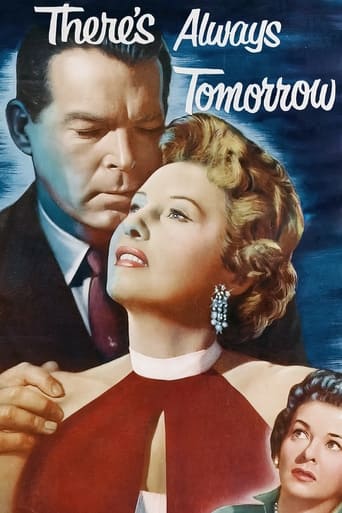Thehibikiew
Not even bad in a good way
MoPoshy
Absolutely brilliant
Patience Watson
One of those movie experiences that is so good it makes you realize you've been grading everything else on a curve.
Anoushka Slater
While it doesn't offer any answers, it both thrills and makes you think.
bkoganbing
This version of There's Always Tomorrow plays a tad better than the original version that Universal Pictures did in 1934. For one thing the overwhelming theme of the Great Depression is not present on the screen and the kids are a bit less shallow than those of the originals.Fred MacMurray is a wealthy toy manufacturer who is alienated by his family especially his kids. Wife Joan Bennett takes dependable Fred for granted and the kids, Gigi Perreau, Judy Nugent, and William Reynolds just see him as a cash cow. When an old flame played by Barbara Stanwyck comes to town the results are inevitable. This is the fourth of four films that Fred MacMurray did with Barbara Stanwyck and while fans of both should be pleased it's hardly in the same league as Double Indemnity. Douglas Sirk who did so well by Rock Hudson in the Fifties directed this version of There's Always Tomorrow. It has the requisite number of suds for the glorified soap opera that it is.
Patricio García Martinez
In her review, at the time on the top of this movie's reviews, lora64 says: "As for first impressions, I have the feeling it's an idealist's wished-for 'dream of a perfect world and perfect people' that never quite comes true, unfortunately, for many in real life. " I think my dearest lora64 misunderstood the film. ANd I think many people misunderstands it. Because the one thing important nobody seems to see. I mean the robot. Unlike conservative Noel Coward's "Brief Encunter",this is the story of a little talking robot living a little idiotic life with his little idiotic family, as he LONGS for escape. Just see the many takes of the robot walking towards the camera. Douglas Sirk was trying to say something there.This film is bitterness and acidity combined in such a masterful way, and finely enough that a lot of people still think they're watching a 'dream of a perfect world and perfect people'.
Dustin Luke Nelson
Virtually unknown among Sirk's catalog, which is reasonably when you consider his classic films like 'All That Heaven Allows' and 'Imitation of Life.' But for a film this good to have not seen a DVD release is criminal. I had the good fortune of being able to see this gem at a public screening this week. This is easily one of the best films to come out of the studio era. The film concerns Clifford Grove (Fred MacMurray) a toy developer, whose family neglects him. His wife bails out on their plans constantly, for the children, and the children pay no attention to their loving father. Clifford runs into an old flame, who is back in town and begins to innocently spend some time with her while she's in town. But his sneaky children become suspicious of his activities and start to follow him, his son begins to convince his siblings that their father is having in affair. Their begin to psychological torment their father and ultimately drive him to desire leaving his family. It's painfully dark, and Fred MacMurray is brilliant. The psychological effect on the viewer is tremendous. It's dark and hopeless. If children were shown this on the advent of puberty, no one would ever get married. The stark black and white cinematography is always telling more than the story, with sneaky, sweeping pans and dollies the film keeps you guessing the duration. It's the kind of backhanded studio film, that was rarely produced, where the director gives the audience only ambiguities for resolution, cyclical images void of hope for Clifford, but ambiguous enough to get by censors at the studio, enough to imply that maybe things turned out for old Clifford. This is studio-era cinema at it's best. If you get a chance to catch a screening of it on the new 35mm that is, supposedly, circulating art-house cinemas around the U.S., go. It's a shame that it is not more widely available, a radiant film from the 50s (though troubled and moderately sexist, symptomatic of the time period, but not so blatant that it can't be overlooked in the same way that critics can overlook the racism in 'Birth of a Nation').
Robert Short
Typical soap opera by director Douglas Sirk (albeit less glossy than his earlier technicolour offerings of "Magnificent Obsession" and "All That Heaven Allows", and certainly less well-known). Having read the comments posted by other viewers about this film, I must confess that I don't quite share their enthusiasm. Although generally well done (and nicely filmed in black-and-white), "There's Always Tomorrow" really offers nothing special in terms of the story line (hard-working, successful businessman Fred MacMurray feels neglected by wife Joan Bennett and their three children, meets old flame Barbara Stanwyck, considers having an affair). However, the film does move along at a good pace, and will certainly hold your interest. The children's perspective of the situation (particularly grown-up child William Reynolds, the oldest of the three) is well presented. The lead roles are very capably acted by old pros MacMurray and Stanwyck, but their re-teaming hardly compares to the dynamic fireworks they displayed in their earlier film, the undeniably great "Double Indemnity". All in all worthwhile, but I wouldn't rank it amidst the classics.

